Completed evaluations
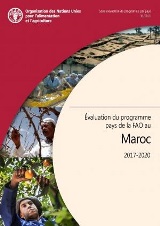
Evaluation of the FAO country programme in Morocco 2017–2020
23/11/2021
The Morocco Country Program (2017-2020) has been evaluated to inform the development of the new programming cycle of FAO and the United Nations System in Morocco for the coming period. [French only]
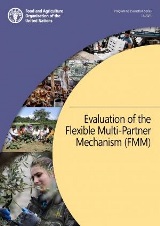
Evaluation of the Flexible Multi-Partner Mechanism (FMM)
22/11/2021
The Flexible Multi-Partner Mechanism (FMM) is a mechanism through which FAO’s resource partners make unearmarked or lightly earmarked voluntary contributions to support achievement of FAO’s Strategic Objectives. OED conducted an evaluation of the current phase of FMM (2018–2021). The purpose of the evaluation was to inform FMM’s main stakeholders about the fund’s overall performance and also inform its next phase (2022–2025).
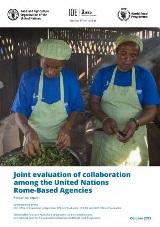
Joint evaluation of collaboration among the United Nations Rome-Based Agencies
15/11/2021
The UN Rome-based agencies (RBAs) – FAO, IFAD and WFP – collaborate in many forms, from joint advocacy, policy and technical work to joint projects. This is the first independent evaluation of collaboration among the RBAs. It has been jointly undertaken by the evaluation offices of FAO, IFAD and WFP. The evaluation’s primary objective was to assess whether and to what extent RBA collaboration is contributing to the achievement of the 2030 agenda, particularly at country level.
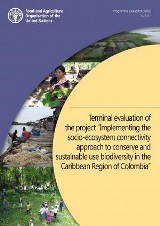
Terminal evaluation of the project "Implementing the socio-ecosystem connectivity approach to conserve and sustainable use biodiversity in the Caribbean Region of Colombia"
03/11/2021
The project “Implementing the socio-ecosystem approach to conserve and sustainable use biodiversity in the Caribbean Region of Colombia” was financed by the GEF, implemented, and executed by FAO.
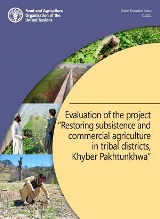
Evaluation of the project “Restoring subsistence and commercial agriculture in tribal districts, Khyber Pakhtunkhwa”
29/10/2021
The Khyber Pakhtunkhwa Newly Merged Districts have seen a prolonged military conflict leading to the wide-spread displacement of its population and damages and losses to the agricultural lands, irrigation and water harvesting structures, and livestock populations. Since 2015, the rehabilitation of the displaced population is ongoing but slow due to loss of livelihoods and reduced income opportunities.
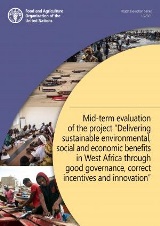
Mid-term evaluation of the project “Delivering sustainable environmental, social and economic benefits in West Africa through good governance, correct incentives and innovation”
29/10/2021
The overall objective of the project is to strengthen governance, management and value chains by the implementation of an ecosystem approach to fisheries, relevant international tools and innovative governance partnerships in Côte d'Ivoire, Cabo Verde and Senegal.
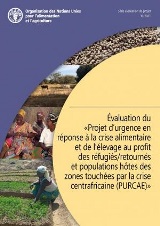
Evaluation of the "Emergency project in response to the food and livestock crisis for the benefit of refugees/returnees and host populations in areas affected by the Central African crisis (PURCAE)"
28/10/2021
The PURCAE project was implemented by the FAO Representation in Chad over the period July 2015 - February 2020. It is part of a broader program of the Government of Chad financed by the World Bank in which other agencies have participated, including the World Food Program (WFP), the International Organization for Migration (IOM) and UNICEF.
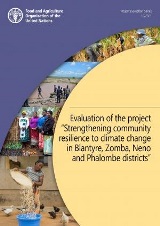
Evaluation of the project “Strengthening community resilience to climate change in Blantyre, Zomba, Neno and Phalombe districts”
28/10/2021
This report documents the evaluation findings of the project “Strengthening community resilience to climate change in Blantyre, Zomba, Neno and Phalombe districts." The project created awareness to the effects of climate change, empowering community members with knowledge and skills on how to apply gender-responsive climate–sensitive practices for increased agricultural production.
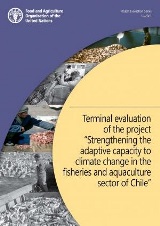
Terminal evaluation of the project "Strengthening the adaptive capacity to climate change in the fisheries and aquaculture sector of Chile"
28/10/2021
The project “Strengthening the adaptive capacity to climate change in the fisheries and aquaculture sector of Chile”, with support from the Global Environment Facility (GEF), sought to reduce the vulnerability and increase the adaptive capacity to climate change in the fisheries and aquaculture sector of Chile.
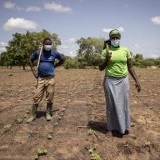
Real-time evaluation of FAO’s COVID-19 Response and Recovery Programme
20/10/2021
The COVID-19 pandemic is jeopardizing human health and disrupting the food systems that are the foundations of health. FAO designed a COVID-19 Response and Recovery Programme with the goal of proactively and sustainably addressing the socio-economic impacts of the pandemic. It aims to enable donors to leverage the Organization’s convening power, real-time data, early warning systems and technical expertise to direct support where and when it is most needed.
